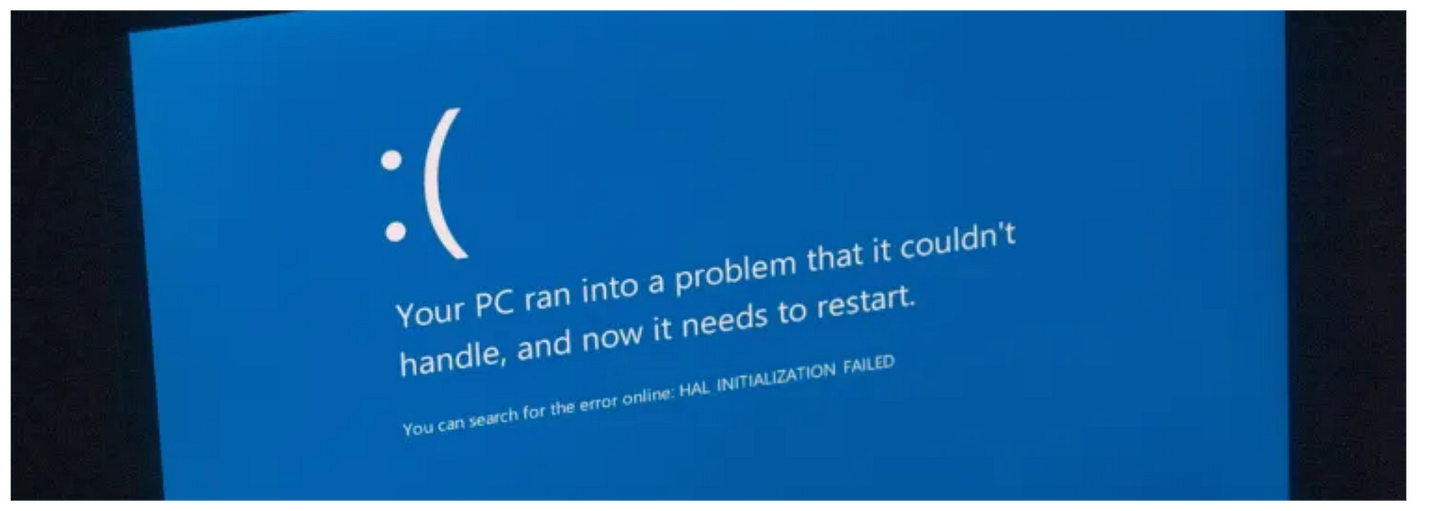Good morning. It’s Monday, March 31. Today we are covering:
SpaceX trying to block Apple satellite messaging expansion
Humanoid Robots Are Lousy Co-Workers. China Wants to Be First to Change That.
Microsoft is redesigning the Windows BSOD and it might change to black
Inside arXiv-the Most Transformative Platform in All of Science
Banks and tech groups commit to live data-sharing in UK fraud clampdown
Let’s dive in
SpaceX trying to block Apple satellite messaging expansion
By Ben Lovejoy via 9to5Mac
SpaceX is pressuring the FCC to block Apple’s expansion of iPhone satellite messaging, citing spectrum conflicts with Starlink, as both companies compete for limited radio frequencies.
Apple, which partners with Globalstar for satellite connectivity, seeks more bandwidth after launching features like Emergency SOS, roadside assistance, and Messages via satellite, backed by a $1B+ investment.
Concerns are growing over Elon Musk’s close ties to the White House and newly appointed FCC Chair Brendan Carr, a Musk ally, especially as Globalstar still relies on SpaceX for satellite launches.
𝕏: MUSK, APPLE CLASH OVER SATELLITE EXPANSION PLANS. TENSIONS HAVE RENEWED MUSK'S INTEREST IN BUILDING IPHONE COMPETITOR, SOURCES SAY - CN Wire (@Sino_Market)
Humanoid Robots Are Lousy Co-Workers. China Wants to Be First to Change That.
By Raffaele Huang via Wall Street Journal
China is racing to lead the development of humanoid robots that can function as capable co-workers, addressing current limitations in coordination, adaptability, and workplace integration.
Despite major progress in robotics and AI, most humanoid robots remain clumsy and impractical in real-world environments, often unable to perform basic collaborative tasks reliably.
Backed by heavy investment and national policy support, Chinese tech firms and research institutions are prioritizing breakthroughs in hardware and autonomy to gain a strategic edge in global automation.
𝕏: Humanoid Robots Are Lousy Co-Workers. China Wants to Be First to Change That. U.S. and China are racing to build a truly useful humanoid worker. Whoever wins could gain a huge edge in countless industries. - Jonathan Cheng (@JChengWSJ)
The best way to reach new readers is through word of mouth. If you click THIS LINK in your inbox, it’ll create an easy-to-send pre-written email you can just fire off to some friends.
Microsoft is redesigning the Windows BSOD and it might change to black
By Tom Warren via The Verge
Microsoft is testing a redesigned Blue Screen of Death (BSOD) for Windows 11, dropping the classic blue color, frowning face, and QR code in favor of a cleaner, update-style black screen.
The new design aligns with Windows 11’s UI principles, aiming to streamline crash notifications while preserving technical details to help users return to productivity faster.
Available now in Insider builds (appearing green for testing), the new BSOD may ship as black or blue in the final Windows 11 version 24H2, marking the first major BSOD revamp since Windows 8.
𝕏: Microsoft is redesigning the Windows BSOD and it might change to black. Microsoft is testing a new BSOD that drops the frowning face, QR code, and traditional blue color. - Tom Warren (@tomwarren)
Inside arXiv-the Most Transformative Platform in All of Science
By Sheon Han via WIRED
Paul Ginsparg, creator of arXiv, revolutionized academic publishing by launching a free, open-access platform for preprints that bypassed the slow, paywalled peer-review process—an innovation now essential to global scientific research.
Despite its success, arXiv has struggled with bureaucratic friction, outdated infrastructure, and Ginsparg’s own polarizing involvement, with critics citing both his indispensable commitment and disruptive micromanagement.
Now hosting over 2.6 million papers and backed by new funding, arXiv is modernizing its tech stack and governance, even as it grapples with challenges around moderation, quality control, and its role in the fast-moving world of AI and open science.
Banks and tech groups commit to live data-sharing in UK fraud clampdown
By Georgina Quach via Financial Times
UK banks, tech, and telecom giants including Barclays, HSBC, Meta, Google, and BT have committed to real-time sharing of fraud data—such as suspicious URLs and unusual transactions—to tackle online scams more effectively.
The move follows a two-month pilot in 2023 and now leverages an automated system exchanging tens of thousands of data points daily, improving scam detection by at least one day earlier than current systems.
As fraud cases surged 20% in 2024, industry leaders and MPs are urging the UK government to take stronger leadership, with new strategies in development to combat AI-enabled fraud and enhance cross-sector coordination.
We're thrilled to bring you ad-free news. To keep it that way, we need your support. Your pledge helps us stay independent and deliver high-quality insights while exploring new ideas. What would you love to see next? Share your thoughts and help shape the future of Newslit Daily. Thank you for being part of this journey!
Trending in AI
AI Experts Say We’re on the Wrong Path to Achieving Human-Like AI
Amazon unveils Nova Act, an AI agent that can control a web browser
China's Zhipu AI launches free AI agent, intensifying domestic tech race
Chatbot Aggregator Wrtn Gets Funding in Latest Korea AI Deal
Google is surprisingly rolling out Gemini 2.5 Pro (exp) to free users
Thanks for reading to the bottom and soaking in our Newslit Daily fueled with highlights for your morning.
I hope you found it interesting and, needless to say, if you have any questions or feedback let me know by hitting reply.
Take care and see you tomorrow!
How was today’s email?



















Share this post